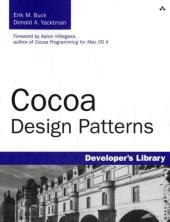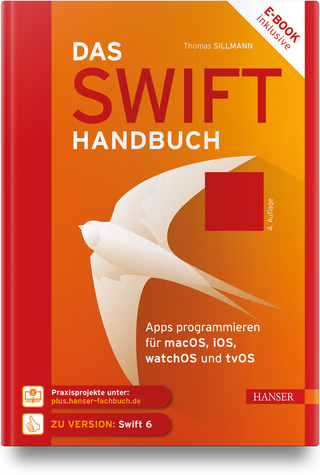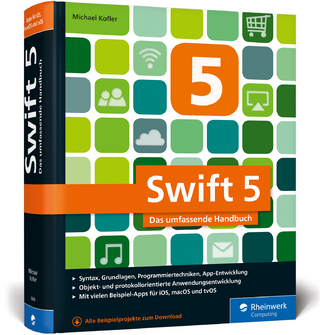
Cocoa Design Patterns
Addison-Wesley Educational Publishers Inc (Verlag)
978-0-321-53502-3 (ISBN)
- Titel ist leider vergriffen;
keine Neuauflage - Artikel merken
–Aaron Hillegass, founder of Big Nerd Ranch, Inc., and author of Cocoa Programming for Mac OS X
Unlocking the Secrets of Cocoa and Its Object-Oriented Frameworks
Mac and iPhone developers are often overwhelmed by the breadth and sophistication of the Cocoa frameworks. Although Cocoa is indeed huge, once you understand the object-oriented patterns it uses, you’ll find it remarkably elegant, consistent, and simple.
Cocoa Design Patterns begins with the mother of all patterns: the Model-View-Controller (MVC) pattern, which is central to all Mac and iPhone development. Encouraged, and in some cases enforced by Apple’s tools, it’s important to have a firm grasp of MVC right from the start.
The book’s midsection is a catalog of the essential design patterns you’ll encounter in Cocoa, including
Fundamental patterns, such as enumerators, accessors, and two-stage creation
Patterns that empower, such as singleton, delegates, and the responder chain
Patterns that hide complexity, including bundles, class clusters, proxies and forwarding, and controllers
And that’s not all of them! Cocoa Design Patterns painstakingly isolates 28 design patterns, accompanied with real-world examples and sample code you can apply to your applications today. The book wraps up with coverage of Core Data models, AppKit views, and a chapter on Bindings and Controllers.
Cocoa Design Patterns clearly defines the problems each pattern solves with a foundation in Objective-C and the Cocoa frameworks and can be used by any Mac or iPhone developer.
Erik M. Buck founded EMB & Associates, Inc. in 1993 and built the company into a leader in the aerospace and entertainment software industries by leveraging the NeXT/Apple software technology that would later become Apple’s Cocoa frameworks. Mr. Buck has also worked in construction, taught science to 8th graders, exhibited oil on canvas portraits, and developed alternative fuel vehicles. Mr. Buck sold his company in 2002 and currently holds the title of Senior Staff at Northrop Grumman Corporation. Mr. Buck received a B.S. degree in computer science from the University of Dayton in 1991 and is a frequent contributor to Cocoa mailing lists and technical forums. Donald A. Yacktman has been using Cocoa and its predecessor technologies, OpenStep and NextStep, professionally since 1991. He coauthored the book Cocoa Programming and has contributed to the Stepwise website as both author and editor. He has worked for Verio/iServer and illumineX in the past. At present he works as an independent consultant assisting in the design and implementation of Cocoa and iPhone applications. Mr.Yacktman received B.S. and M.S. degrees in electrical and computer engineering from Brigham Young University in 1991 and 1994, respectively.
Preface xix
Part I: One Pattern to Rule Them All 1
Chapter 1: Model View Controller 2
Chapter 2: MVC Analyzed and Applied 17
Part II : Fundamental Patterns 28
Chapter 3: Two-Stage Creation 29
Chapter 4: Template Method 43
Chapter 5: Dynamic Creation 53
Chapter 6: Category 63
Chapter 7: Anonymous Type and Heterogeneous Containers 77
Chapter 8: Enumerators 85
Chapter 9: Perform Selector and Delayed Perform 99
Chapter 10: Accessors 107
Chapter 11: Archiving and Unarchiving 123
Chapter 12: Copying 135
Part III: Patterns That Primarily Empower by Decoupling 147
Chapter 13: Singleton 148
Chapter 14: Notifications 159
Chapter 15: Delegates 175
Chapter 16: Hierarchies 191
Chapter 17: Outlets, Targets, and Actions 206
Chapter 18: Responder Chain 220
Chapter 19: Associative Storage 232
Chapter 20: Invocations 242
Chapter 21: Prototype 255
Chapter 22: Flyweight 263
Chapter 23: Decorators 268
Part IV: Patterns That Primarily Hide Complexity 274
Chapter 24: Bundles 275
Chapter 25: Class Clusters 282
Chapter 26: Façade 302
Chapter 27: Proxies and Forwarding 312
Chapter 28: Managers 328
Chapter 29: Controllers 337
Part V : Practical Tools for Pattern Application 364
Chapter 30: Core Data Models 365
Chapter 31: Application Kit Views 379
Chapter 32: Bindings and Controllers 393
Appendix: Resources 404
Index 407
| Reihe/Serie | Developer's Library |
|---|---|
| Verlagsort | New Jersey |
| Sprache | englisch |
| Maße | 180 x 232 mm |
| Gewicht | 752 g |
| Themenwelt | Informatik ► Programmiersprachen / -werkzeuge ► Mac / Cocoa Programmierung |
| Mathematik / Informatik ► Informatik ► Theorie / Studium | |
| ISBN-10 | 0-321-53502-2 / 0321535022 |
| ISBN-13 | 978-0-321-53502-3 / 9780321535023 |
| Zustand | Neuware |
| Informationen gemäß Produktsicherheitsverordnung (GPSR) | |
| Haben Sie eine Frage zum Produkt? |
aus dem Bereich

